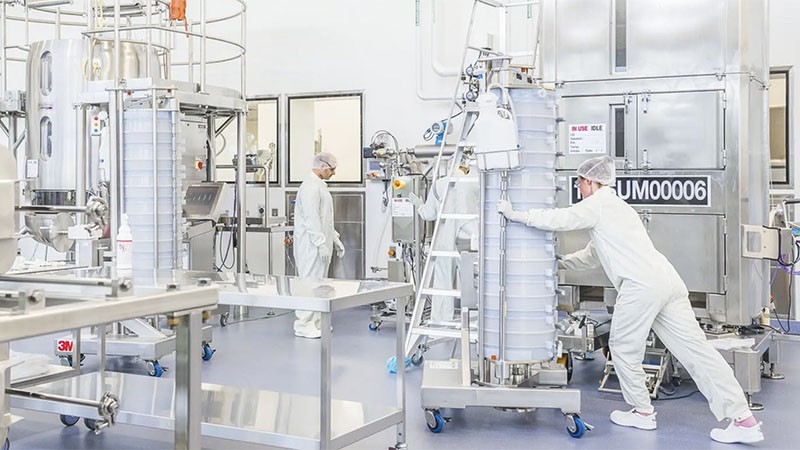What is Pharma

Image: CSL Behring
Pharma… Biopharma… Medical Devices…
What does it all mean?!
These industries have shown nothing but strong growth for the last several years – and you’ve probably heard more about medicines and vaccine manufacture since 2020, than you ever knew you could!
This strong growth means that there are more jobs across the UK and Ireland than ever before, and these jobs bring brilliant long-term career prospects with excellent salaries.
But before you make the leap, you’re going to need to get to know some basic information about them…
Pharma
You’ve probably heard of the pharmaceutical industry. It’s known as “Pharma” for short.
This industry makes medicines and vaccines on an industrial scale. Every pill, tablet, or vaccine you’ve ever taken was researched, tested, and manufactured by a pharmaceutical company.
Traditional Pharma brings together chemical ingredients (made from scratch in the manufacturing plant) and combines them to make an Active Pharmaceutical Ingredient (API). This is the part of the medicine that actually has an effect in your body. It usually has to be mixed with other things to produce the final tablet, cream, or vaccine that the human body can actually use.
The painkiller paracetamol is a good example of a Pharma product.
By the time these products are being manufactured, they’ve undergone lots of tests (clinical trials) to make sure they’re safe for patients. So the manufacturing stage is about following the same tried and tested “recipe” again and again to produce exactly the same medicine.
This is why manufacturing medicines isn’t really about science, it’s about systems. It’s about following processes and checking quality.
That means that people working in Pharma manufacturing follow lots of strict rules and regulations. They typically work in special areas called “clean-rooms” where lots of precautions are taken to keep everything clean, they wear special outfits to make sure they don’t contaminate products as they make them, and they fill in documentation to show that the “recipe” has been followed exactly as it was meant to.
It’s an unusual manufacturing environment, but think about every time you’ve taken a medicine or vaccine… you’ve had to trust that it’s been made correctly and will do what it’s supposed to. That’s exactly what all these procedures are designed to do.
This video from AstraZeneca gives a good overview of the pharmaceutical manufacturing process…
Biopharma
Biopharmaceuticals (Biopharma) are a specialist subset of the Pharma industry.
We said that traditional Pharma brings together chemical ingredients (made from scratch in the manufacturing plant) and combines them to make an Active Pharmaceutical Ingredient (API).
In Biopharma, the “active bit” of the products are found in biology. That might be a protein, a cell, or a gene, for example.
These naturally occurring ingredients are grown within manufacturing plants at a large scale, and then combined with other things to make the final product.
This can sound a little confusing (especially if you haven’t studied much science before) but if you were to get a job in a Biopharma plant, you’d be given lots of training on all the things you had to know before you’d be allowed on the manufacturing floor.
And it’s worth remembering that you won’t ever need to fully understand all the science behind a product to have a successful manufacturing career. What’s most important is that you have an awareness of the manufacturing rules and regulations, so you can make sure that the same “recipe” is being followed each and every time a medicine is made.
For a closer look at manufacturing biologics specifically, check out the video below. It’s a little science-heavy at the very start but gives a great overview of the manufacturing process as it progresses.
Medical Devices
The Medical Device industry is sometimes also referred to as Medical Technology (or MedTech).
This is a wide encompassing term for any product, instrument, or item that is used to diagnose, prevent, treat, or cure health conditions without any chemical change on or within the body.
Examples include heart monitors, blood glucose meters, surgical equipment, artificial joints, or even contact lenses.
While these are very different products – and are manufactured in a different way to Pharma or Biopharma – hopefully it’s no surprise that there’s the same need to follow a strict manufacturing environment. It’s still essential that these products are safe and reliable for patients.
So even for a job in Medical Device manufacturing, you’re going to have to be able to show an awareness of the rules and regulations, and how they’re implemented in these manufacturing plants. This, of course, is the purpose of Module 1 of the Pharma Manufacturing Essentials course.
Keeping Your Options Open
The good news is that while all these options follow slightly different manufacturing processes, the rules and regulations are the same for them all.
So to get started you don’t need to “pick one”.
By taking our Pharma Manufacturing Essentials course, you’ll gain all the basic technical knowledge you need to catch an employer’s attention.
From there, any company hiring you will give you the specific information you need to be able to complete the job role before you’re allowed on the manufacturing floor.
And remember – you don’t need to be a scientist or an engineer. You don’t need to understand how a product works within the human body to be able to make it safely. Production and manufacturing staff (particularly at entry-level) and given very specific instructions to follow, so you’ll never have to guess whether you’re doing it right.
Got More Questions?
Fill in your details below and we’ll get back to you within 48 working hours at the latest.